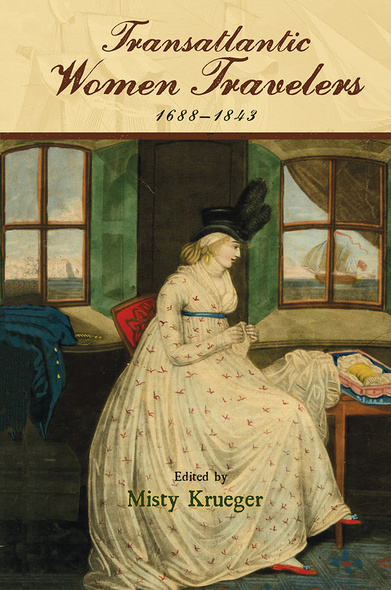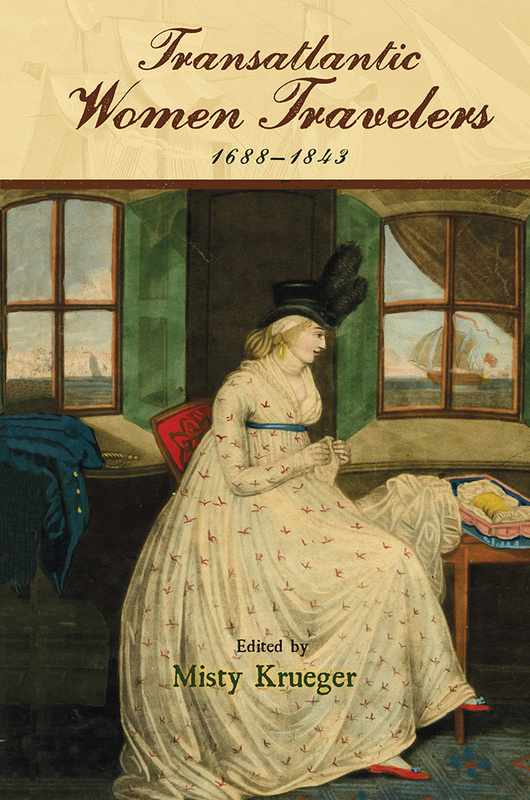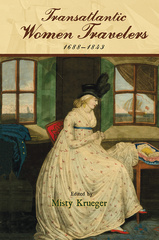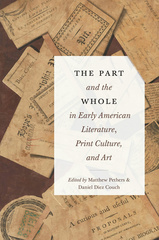Our shopping cart is currently down. To place an order, please contact our distributor, UTP Distribution, directly at utpbooks@utpress.utoronto.ca.

246 pages, 6 1/8 x 9 1/4
9 color illustrations, 1 b-w illustration
Hardcover
Release Date:12 Mar 2021
ISBN:9781684482979
This important new collection explores representations of late seventeenth- through mid-nineteenth-century transatlantic women travelers across a range of historical and literary works. While at one time transatlantic studies concentrated predominantly on men’s travels, this volume highlights the resilience of women who ventured voluntarily and by force across the Atlantic—some seeking mobility, adventure, knowledge, wealth, and freedom, and others surviving subjugation, capture, and enslavement. The essays gathered here concern themselves with the fictional and the historical, national and geographic location, racial and ethnic identities, and the configuration of the transatlantic world in increasingly taught texts such as The Female American and The Woman of Colour, as well as less familiar material such as Merian’s writing on the insects of Surinam and Falconbridge’s travels to Sierra Leone. Intersectional in its approach, and with an afterword by Eve Tavor Bannet, this essential collection will prove indispensable as it provides fresh new perspectives on transatlantic texts and women’s travel therein across the long eighteenth century.
Following historical and fictional women as they journey transatlantically and beyond, this collection offers welcome insight into the many transformations—material and intellectual—produced by travel. For some, the oceanic journey might be revelatory and liberatory; alternatively or simultaneously, it might reproduce exoticization and empire. In presenting a variety of experiences and imaginings, this book is for interdisciplinary scholars of gender and also race, colonialism, and more in the circum-Atlantic eighteenth century.
The strengths of this volume are many. Foremost, its clever organization illuminates the resonances between women travelers in different modes: as historical figures, writers, and characters. Its coverage offers fresh new perspectives on transatlantic texts. The combination of these features makes this a useful, indeed indispensable, volume for transatlantic studies.
The volume’s organization, meant to question (and push) boundaries between real and imagined travel, between ‘factual’ and ‘fictional’ accounts, is useful. Its most important contribution is the attention to the intersection of gender and empire as well as many of the authors’ careful attention to colonial subjectivity. Those who read, research, or teach this period will certainly find new sources to digest and productive ways of reimagining familiar material.
Offers not only new insights and approaches to scholarship on this subject but also a fantastic guide for teaching these works and their larger sociopolitical transatlantic contexts. Especially in its careful attention to issues of gender and race, the collection provides a welcome intervention and model within current research practices pertaining to this and related topics. The volume is truly impressive and should be considered necessary reading for anyone interested in this era’s historical and literary accounts of the transatlantic world.
MISTY KRUEGER is an assistant professor at the University of Maine at Farmington, where she teaches seventeenth- through nineteenth-century literature and writing. She was the 2017 Jane Austen Society of North American International Visitor, has co-edited an issue for the Austen journal Persuasions On-Line, and has published essays on Austen juvenilia, novels, adaptation, pedagogy, and social media. She has also published on Delarivier Manley, Restoration Shakespearean adaptations, and William Blake.
Introduction: Tracing the Lives of Transatlantic Women Travelers
Misty Krueger
Part One: (Pseudo)Historical Women’s Travels
1 “Little Atlas”: Global Travel and Local Preservation in Maria Sybilla Merian’s The Metamorphosis of the Insects of Surinam
Diana Epelbaum
2 Thresholds of Livability: Climate and Population Relocation in Anna Maria Falconbridge’s Two Voyages to Sierra Leone
Shelby Johnson
3 Transatlantic Female Solidarity: Two Women Social Explorers and Their Views on Nineteenth-Century Latin American Women
Grace A. Gomashie
4 “The Fair Daughters Of Terra Nova”: Women in the Settler Cultures of Early Nineteenth-Century Newfoundland
Pam Perkins
5 Busty Buccaneers and Sapphic Swashbucklers on the High Seas
Ula Lukszo Klein
Part Two: Fictional Women’s Travels
6 Gender Performance and the Spectacle of Female Suffering in Samuel Jackson Pratt’s Emma Corbett
Jennifer Golightly
7 “That Person Shall Be a Woman”: Matriarchal Authority and the Fantasy of Female Power in The Female American
Alexis McQuigge
8 “I Am Disappointed in England”: Reverse-Robinsonades and the Transatlantic Woman as Social Critic in The Woman of Colour
Octavia Cox
9 Creole Nationalism, Mobility, and Gendered Politics in Zelica, the Creole
Victoria Barnett-Woods
10 Feminine Negotiations within the Colony: Aphra Behn’s Oroonoko and Phebe Gibbes’ Hartly House
Kathleen Morrissey
Afterword
Eve Tavor Bannet
Bibliography
Notes on Contributors
Index
Misty Krueger
Part One: (Pseudo)Historical Women’s Travels
1 “Little Atlas”: Global Travel and Local Preservation in Maria Sybilla Merian’s The Metamorphosis of the Insects of Surinam
Diana Epelbaum
2 Thresholds of Livability: Climate and Population Relocation in Anna Maria Falconbridge’s Two Voyages to Sierra Leone
Shelby Johnson
3 Transatlantic Female Solidarity: Two Women Social Explorers and Their Views on Nineteenth-Century Latin American Women
Grace A. Gomashie
4 “The Fair Daughters Of Terra Nova”: Women in the Settler Cultures of Early Nineteenth-Century Newfoundland
Pam Perkins
5 Busty Buccaneers and Sapphic Swashbucklers on the High Seas
Ula Lukszo Klein
Part Two: Fictional Women’s Travels
6 Gender Performance and the Spectacle of Female Suffering in Samuel Jackson Pratt’s Emma Corbett
Jennifer Golightly
7 “That Person Shall Be a Woman”: Matriarchal Authority and the Fantasy of Female Power in The Female American
Alexis McQuigge
8 “I Am Disappointed in England”: Reverse-Robinsonades and the Transatlantic Woman as Social Critic in The Woman of Colour
Octavia Cox
9 Creole Nationalism, Mobility, and Gendered Politics in Zelica, the Creole
Victoria Barnett-Woods
10 Feminine Negotiations within the Colony: Aphra Behn’s Oroonoko and Phebe Gibbes’ Hartly House
Kathleen Morrissey
Afterword
Eve Tavor Bannet
Bibliography
Notes on Contributors
Index






